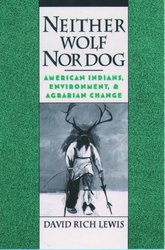Description
This essay discusses the effects of American Indian reservations on their environment and agrarian practices in the 19th and 20th centuries. The author, David Rich Lewis, discusses the experiences of three groups of American Indians--Northern Utes, Hupas, and Tohono O'odhams--who inhabited different environments and had to adapt to changing federal agrarian policies. All three groups experienced subsistence change, which led to diminished economic dependency and cultural continuity.
During the nineteenth century, Americans looked to the eventual civilization and assimilation of Native Americans through a process of removal, reservation, and directed culture change. Neither Wolf Nor Dog explores the experiences of three groups--Northern Utes, Hupas, and Tohono O'odhams--with settled reservation and allotted agriculture in the nineteenth and twentieth centuries. Each group inhabited a different environment, and their cultural traditions reflected distinct subsistence adaptations to life in the western United States. Author David Rich Lewis shows how each group experienced the full weight of federal agrarian policy yet responded differently, in culturally consistent ways, to subsistence change and the resulting social and environmental consequences. Attempts to establish successful agricultural economies ultimately failed as each group reproduced its own cultural values in a diminished and rapidly changing environment. In the end, Lewis demonstrates, such policies and agrarian experiences left Indian farmers marginally incorporated and economically dependent.
